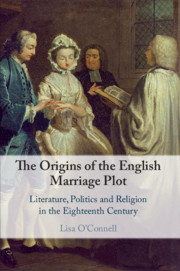 The Origins of the English Marriage Plot
The Origins of the English Marriage Plot Published online by Cambridge University Press: 08 July 2019
Clandestine marriage played a significant role in the English marriage plot’s development. Before being suppressed by the Marriage Act, it had spawned its own popular culture, whose history helps to explain what was at stake in the division of ‘proper’ from ‘improper’ ceremony that was so important to the new genre. This chapter outlines the conditions for the rise of clandestine marriage before taking account of its cultural profile centred on London’s so-called Fleet marriage market, a hub of the city’s boisterous commercial street life and tavern culture and a focus of its stage entertainments. If the marriage debate appealed to erudite theories in the halls of power, clandestine marriage and its representations belonged to more unruly and demotic spaces. In a remarkable feat of reconfiguration, however, by the century’s second half clandestine marriage had become an element of respectable (and sentimental) culture.
To save this book to your Kindle, first ensure no-reply@cambridge.org is added to your Approved Personal Document E-mail List under your Personal Document Settings on the Manage Your Content and Devices page of your Amazon account. Then enter the ‘name’ part of your Kindle email address below. Find out more about saving to your Kindle.
Note you can select to save to either the @free.kindle.com or @kindle.com variations. ‘@free.kindle.com’ emails are free but can only be saved to your device when it is connected to wi-fi. ‘@kindle.com’ emails can be delivered even when you are not connected to wi-fi, but note that service fees apply.
Find out more about the Kindle Personal Document Service.
To save content items to your account, please confirm that you agree to abide by our usage policies. If this is the first time you use this feature, you will be asked to authorise Cambridge Core to connect with your account. Find out more about saving content to Dropbox.
To save content items to your account, please confirm that you agree to abide by our usage policies. If this is the first time you use this feature, you will be asked to authorise Cambridge Core to connect with your account. Find out more about saving content to Google Drive.